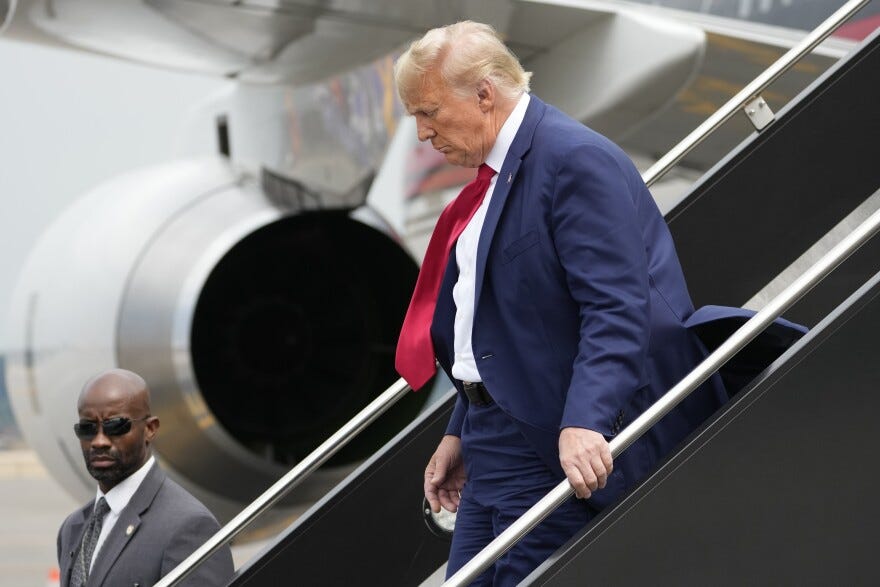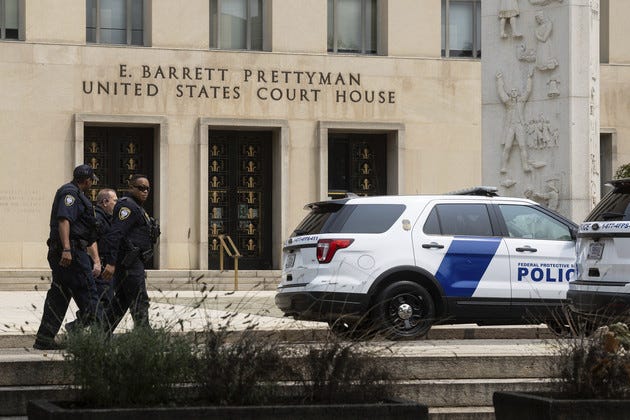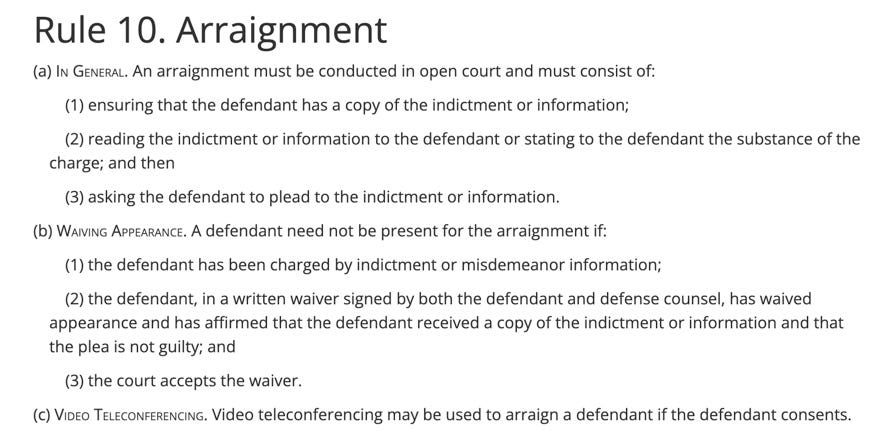Today, the 45th President of the United States, Donald J. Trump, was arraigned on criminal charges. Again.
This time, it was on charges that should shake even the former president’s strongest supporters to the core, although it's highly unlikely that they will. That is not to say that the charges Trump faces in New York or the federal charges of gross mishandling of classified documents and obstruction Mar-a-Lago are not important, because they are. But it is the charges related to Trump’s efforts to circumvent the results of the 2020 presidential election that speak most directly to who the man is and the accountability that the Constitution demands of him. We demand that accountability too. We are entitled to it—not the lock him up chants that Trump himself would use against perceived enemies, but the people’s justice, in an American courtroom, with all the due process a defendant should receive.
Many people in our country have become inured to Trump’s behavior. He is selfish. He is greedy. He is narrow minded and cruel. He had no problem ripping babies from their mothers’ arms; he permitted it on his watch as president. He made fun of people with disabilities. He sexually assaulted a woman and continued to make cruel comments about her the day after a jury convicted him of defamation.
A real problem with Trump is that there is just so much of it that he is exhausting. For some people, it's easier to tune it out than it is to try and keep all of it in focus. The details get submersed in the morass. This new indictment is the moment where those who’ve said they just can’t follow the news should be able to reconnect, to follow the progress of these most important charges, whether they agree with them or not. Challenge your friends and acquaintances who may have unplugged along the way because they felt overwhelmed to reengage and follow along, so they can assess the evidence and the proceedings for themselves.
It’s every American’s obligation to follow this process. Trump faced the beginnings of accountability for trying to end democracy in a magistrate judge’s courtroom in the E. Barrett Prettyman Courthouse in Washington, D.C., Thursday afternoon.
The quick overview: Trump is charged with three counts of conspiracy in connection with his efforts to steal the 2020 presidential election after he lost it. He is charged with conspiracy to defraud the United States. He is charged with conspiracy to obstruct congressional proceedings to certify the vote and with a substantive count of obstruction in connection with those proceedings. And most significantly in my mind, he is charged with a conspiracy to violate the civil rights of American voters. He is charged with trying to cancel out our right to vote. The indictment alleges he has six still unindicted co-conspirators.
Arraignment is usually a perfunctory matter, as it was for Trump today. It is governed by Rule 10 of the Federal Rules of Criminal Procedure, which require that a defendant be advised of the charges against him and enter a plea to them. The traditional plea at the time of arraignment is one of not guilty. The defendant has not yet seen the government’s evidence against him—there is no informed basis for knowing whether the government can prove what it has charged. So it is no surprise that the plea Donald Trump entered today was one of not guilty.
Magistrate judges are Article I judges, not Article III judges. That’s a reference to the provision of the United States Constitution that provides for their appointment. Article III judges are appointed by the president, confirmed by the Senate and receive life tenure to serve in the federal courts created by the Constitution. Magistrate judges are selected by a majority vote of the district judges who make up the court they serve, part of a congressionally created infrastructure for carrying out the courts’ mission. They serve for a term of eight years. Their responsibilities can vary in different federal districts, but they can conduct arraignments, and in criminal cases, they often take a first cut at pretrial motions. They issue an initial ruling, a report and recommendation, that either party is free to appeal to the district court if they believe it’s wrong. It's likely that we will see more of Magistrate Judge Moxila Upadhyaya in these proceedings.
Trump’s appearance today was routine. He has had practice, after all. Magistrate Judge Moxila Upadhyaya entered the courtroom around 4:15 pm, Eastern Time. After a brief exchange, Trump entered his not guilty plea. The hearing did not last long, although the Judge did take time to tell Trump that among his conditions of release was one requiring him not to commit new crimes. This is a standard thing judge’s say at arraignment. Her warning to Trump that any attempts to influence a juror or witness would be a crime, however, is not part of the standard litany you hear at arraignment.
Given that the punishment for violating conditions of release can be custody, perhaps Judge Upadhyaya was being careful to ensure he understood what was at stake so there could be no excuses should it come to that. And she admonished Trump that if he violated his conditions of release he could be jailed. In other words, the former president, who is now “Mr. Trump” in court, is receiving the same treatment as any over defendant.
Part of Judge Upadhyaya’s role was to advise the parties as to how District Judge Tanya Chutkan intends to proceed. The answer is, quickly. She set a first hearing date on August 28, and will set a trial date at that hearing. That gives the government time to convey discovery to Trump’s lawyers, who said they anticipated it would be massive. Expect the special counsel’s office to move quickly here so they can argue to Judge Chutkan on the last Monday in August that everything the defense needs is in the works and she can set an early trial date.
On a side note, three law enforcement officers who were present at the Capitol on January 6, Metro Police Department Officer Daniel Hodges, former Capitol Police Officer Aquilino Gonnell and Capitol Police Officer Harry Dunn, watched the arraignment from an overflow room at the courthouse. They were escorted in by the U.S. Marshals service. A poignant reminder of what Trump cost so many people.
Arraignments are meant to be quick and straightforward, and this one was. But it is still a very important day in American history. Donald Trump was treated like anyone else in his position would be. Investigation having found that there is sufficient evidence of significant crimes, he has been charged by a grand jury. He now has the same opportunity to defend himself that anyone would have. He is surrounded by an experienced legal team. They will have the opportunity to thoroughly scrutinize the discovery that the government will hand over, and to challenge the government on both its facts and the law. The outcome of the case will most likely be decided by a jury that will hear all of the evidence in court and, standing in for all of us, make a decision about whether or not the government has proved its case against Donald J. Trump beyond a reasonable doubt.
There will be concerns about timing. Trump clings to the possibility of returning to the presidency like a drowning man clings to a piece of driftwood. That return to power is his last, best and perhaps only chance of avoiding criminal accountability for his conduct.
All of the charges in the indictment are equally important, but the one that tears at my heart is Count Four, the conspiracy by an American president to take away our right to vote. The indictment alleges that Trump conspired to “injure, oppress, threaten, and intimidate one or more persons in the free exercise and enjoyment of a right and privilege secured to them by the Constitution and laws of the United States—that is, the right to vote, and to have one’s vote counted.” Sobering no matter who the defendant is, but even more so when it is a former president.
Only 12 people will sit on the jury in the courtroom when his case is called. But we will all still play a big role. Because we are the jury in the court of public opinion, and the outcome of the 2024 election really is every inch the most important election of our lives. The indictment itself is not evidence, but it lays out the narrative of the facts we saw unfold before our eyes and helps us make sense of the crimes that Trump is charged with committing. It is an important document for every American to read. Not everyone will, but that's where we can come in, sharing details, and helping people around us, understand the procedures that begin today. It's the real work of saving the republic.
We’re in this together,
Joyce






My two-cents' worth: I don't need to see a photo of Donald Trump every time he is mentioned in an article. It's as if the editors think we may confuse him with some other obese psychopath. Trump's ability to manipulate the media is really unprecedented. I love this substack and really appreciate Joyce Vance's explanations and comments. But I am really tired of seeing Trump's image everywhere I turn.
Ms. Joyce Vance: Former President Trump has undergone today his third indictment, and you point out eloquently that today's charges "speak most directly to who the man is and the accountability that the Constitution demands of him."
As you point out, we demand accountability, not for mere vengeance -- in that we are unlike Trump -- but for the soundness of our American Republic.
You remind us Citizens of the duty to stay on top of this judicial process, which is the noblest feature of our British Common Law heritage.
At 75 years, I had watched carefully the Sam Ervin Committee throughout the Watergate Hearings 50-years ago.
Unfortunately, in my lifetime, Trump has subjected America to a second series of trials that reach to the essence of our Republic.
Your words comfort me that, "We are in this together."